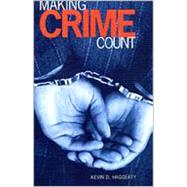Making Crime Count
, by Haggerty, Kevin D.- ISBN: 9780802048097 | 0802048099
- Cover: Hardcover
- Copyright: 4/1/2001
Official statistics are one of the most important sources of knowledge about crime and the criminal justice system. Yet, little is known about the inner workings of the institutions that produce these numbers. In this groundbreaking study, Kevin D. Haggerty sheds light on the process involved in the gathering and disseminating of crime statistics through an empirical examination of the Canadian Centre for Justice Statistics (CCJS), the branch of Statistics Canada responsible for producing data on the criminal justice system. Making Crime Countdetails how the availability of criminal justice statistics has fostered a distinctive approach to the governance of crime and criminal justice. What has emerged is a form of actuarial justice whereby crime is increasingly understood as a statistical probability, rather than a moral failing. At the same time, statistics render criminal justice organizations amenable to governmental strategies that aim to manage the system itself. Using contemporary work in the sociology of science as a frame, Haggerty explores the means by which the CCJS has been able to produce its statistics. The emphasis is on the extra-scientific factors involved in this process, the complex knowledge networks that must be aligned between assorted elements and institutions, and, specifically, the continual negotiations between CCJS employees and the police over how to secure data for the 'uniform crime report' survey. The conclusions accentuate the need for anyone studying governance to consider the politics and processes of governmental knowledge production.






